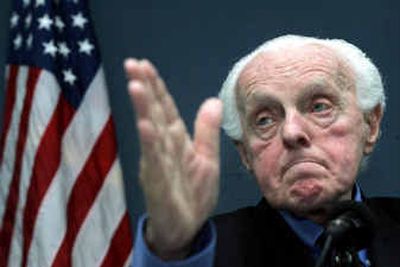N. Korea may return to table

BEIJING – Rep. Tom Lantos, D-Calif., who played a role in the negotiations to end Libya’s nuclear program, said Tuesday after a visit to North Korea that he was “considerably more optimistic” that Pyongyang was ready to return to the stalled six-party talks over its nuclear ambitions.
“I hope my visit opens a new chapter in U.S.-North Korea relations, just as my three visits to Libya in 2004 have played an important role in dramatically improving Libya-U.S. relations,” said Lantos, the ranking Democrat on the House International Relations Committee, at a news conference in Beijing.
North Korea has kept the world at bay for more than two years, alternately threatening to deploy nuclear weapons and participating in international talks to give up its nuclear programs in exchange for a comprehensive aid and security package.
Given North Korea’s history of bellicosity and brinkmanship, Lantos’ three days of meetings with Pyongyang’s leadership are no indication of whether the long-running and dangerous diplomatic impasse is closer to a resolution. But the visit by Lantos, a vocal critic of Pyongyang in Congress, was one of the first opportunities since November’s U.S. elections for North Korean President Kim Jong Il to send a message to Washington.
Three rounds of talks since 2003 involving the United States, North and South Korea, China, Japan and Russia have made little headway. In recent months, the North Koreans had been holding back on negotiations, awaiting the outcome of the U.S. presidential election.
Lantos said the North indicated it may now be ready to continue talks. He said he set out in “blunt and realistic” terms that the United States was ready to negotiate a verifiable, comprehensive deal in which North Korea would receive security guarantees, diplomatic recognition, economic and educational assistance and other benefits in exchange for abandoning its nuclear activities.
“I had extremely serious, professional and valuable dialogues with North Korean interlocutors,” Lantos said, and he left those meetings with North Korea’s foreign minister, vice president and others feeling his message had been heard.
Lantos met North Korea’s foreign minister and several other high-ranking officials but not Kim. He said he hoped to return for more talks in a month.
Lantos emphasized his role in helping coax another unfriendly country, Moammar Gadhafi’s Libya, to denuclearize. In neither situation, he told the North Koreans, was Washington’s intent to oust the leadership. Rather, he said, the U.S. goal is to reduce the production of nuclear arms to make the world safer.
“I pointed out that in the case of Libya, there was no discussion of regime change,” he said. “The regime changed itself in terms of dramatic new policies.”